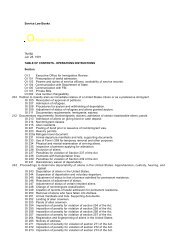You also want an ePaper? Increase the reach of your titles
YUMPU automatically turns print PDFs into web optimized ePapers that Google loves.
<strong>Inspector's</strong> <strong>Field</strong> <strong>Manual</strong><br />
"Stockholm Syndrome" starts to develop. As this happens you will be less likely to be harmed. Remember<br />
transference is a normal occurrence. You will not be able to avoid it. It is natural and has kept many hostages<br />
alive.<br />
3. Don't speak unless spoken to and then only when necessary - try not to appear hostile but do not be<br />
overly friendly or phony.<br />
4. Try to rest - After things settle down, try to get as much rest as possible without turning your back on<br />
your captor.<br />
5. Don't make suggestions - This is very important. If your suggestion is used and something goes<br />
wrong, your captor may feel that you planned it that way to trick him. At that point there is the danger that he or<br />
she may begin identifying you as his or her enemy rather than a bystander caught in the middle (negative<br />
transference).<br />
6. Escape: Should you or shouldn't you? - Simply stated, don't try to escape unless you are absolutely sure<br />
you will be successful. If you are recaptured violence may be used to "teach the others a lesson".<br />
7. Special medication or aid - If there are any hostages who require special medication or aid, inform<br />
your captors. Be matter of fact about it and do not pester them. Most captors do not want anyone to die on their<br />
hands or they would not have taken hostages in the first place.<br />
8. Be observant - you may be released or escape and can help the police - Try to remember everything<br />
that you see and hear. Memorize the descriptions of your captors, what names they use and how they refer to<br />
each other. What kind of weapons or other equipment do they have? Where are the hostages being kept? Has a<br />
routine been established for eating and/or sleeping? Finally, try to recall the number and identities or<br />
descriptions of the other hostages as well.<br />
9. Be prepared to answer the police on the phone - If you are permitted to answer the phone, be prepared<br />
to answer questions with "yes" or "no" responses. If the captor is listening in try to advise the police by saying<br />
something like, "Don't lie to us because he (or she) can hear what you're saying". If what you are made to tell the<br />
police is untrue, make reference to some relative or factual incident in an incorrect manner so that the police<br />
know that you are under duress. For example, you can tip the police off by saying, "My brother will handle the<br />
bills", when in fact, you do not have a brother.<br />
10. Don't be argumentative - Non-cooperative attitudes with the captors or with other hostages have<br />
brought harm to some hostages in the past. The captor may perceive this behavior as aggression towards him or<br />
her.<br />
11. Treat the captor like royalty - Don't turn your back on your captor unless ordered to. Don't stare at<br />
him or her either. A so called "down the nose look" may bring a violent reaction. Remember, a captor is less<br />
likely to harm someone with whom he or she has eye contact.<br />
12. Be patient - Though it may seem that the police are doing nothing they are working on a plan to get you<br />
out along with the other hostages. Be patient and be prepared to wait.<br />
13. If a rescue comes - If you believe a rescue attempt is taking place or if you hear a noise or shooting, hit<br />
the floor and stay down. Keep your hands on your head and do not make any fast moves. If you are ordered<br />
out, follow the directions quickly with your hands in full view. Be prepared to be frisked by the police.<br />
Remember, they may not be sure about the number of terrorists involved and you don't want to bring about a<br />
reflex reaction by the police if you balk at being frisked. Just submit, its nothing personal.<br />
There are no guarantees, but by following these guidelines over the years, many lives have been saved.<br />
Most of the information is taken from Hostage Cop, by Cap't. Frank Bolz and Edward Hershey, Rawson, Wade<br />
Publishers, NY, 1979. In addition, the Service course outline on Terrorism and Victimization was used.<br />
2.9 Dealing with Attorneys and Other Representatives.




